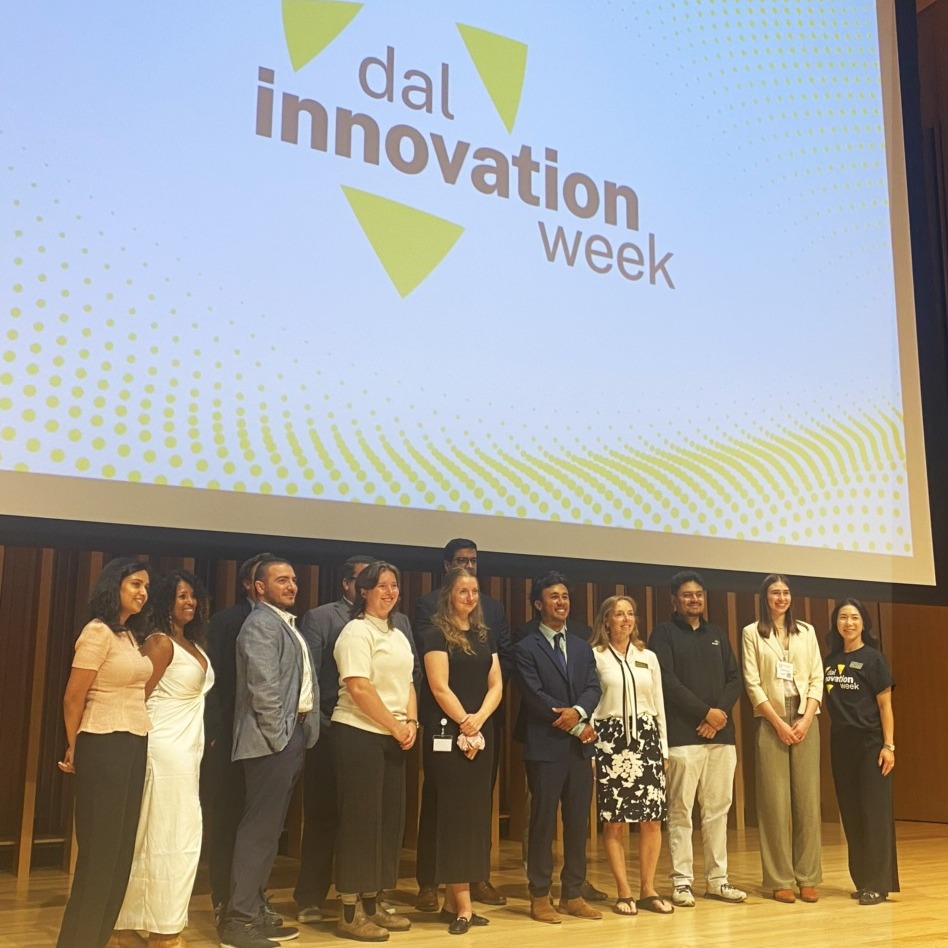
Meet Dal Innovates’ next generation of entrepreneurs
Startups take over Dal Demo Day
Dalhousie University’s Joseph Strug Music Hall transformed from an auditorium to an idea hub on Sept. 24 as student entrepreneurs pitched to win a share of an $18,000 prize pool.
Dal Innovates hosted the Demo Day event as part of Dal Innovation Week — a nine-day program of 15 events that showcased entrepreneurial projects from across Atlantic Canada.
The organization offers entrepreneurship programs and mentorship for Dalhousie students and faculty to develop skills and transform their ideas into market-ready companies.
“It really opens up the pipeline that entrepreneurship is a viable career path,” says Natalie McMullin, associate director of marketing and communications at Dal Innovates. “It allows them to explore their passion.”
Dal Demo Day showcased projects from Dal Innovates’ two flagship innovation programs, Lab2Market, focused on research-based ventures, and Collide, geared towards non-research projects from undergraduate students.
“These programs are really helping the local economy. We’ve also seen a lot of the founders that have gone through our program have a national impact,” says McMullin.
Nimbus
Melina Markotjohn may have finished her master’s degree in audiology, but the third-year Dalhousie medical school student’s latest project is still all about ears.
Nimbus, Markotjohn’s venture, is developing earplugs with features like noise cancellation and filters that block disruptive sounds while keeping speech and alarms audible.
Her product tied for first place in the Collide stream at Dal Demo Day.
“I was caught off guard if I’m honest,” says Markotjohn. “I was very excited about it once it finally registered, but I certainly was pleasantly shocked at first. There were so many amazing pitches and projects.”
She says the event provided an opportunity to connect with others in the innovation community and learn about available resources.
“It’s nice to discuss something you’re passionate about and pitch the idea in a room of open-minded people,” says Markotjohn.
Beyond drawing inspiration from her master’s degree, Markotjohn says her father’s use of hearing aids also influenced her project.
“It made me really start to think, ‘What can we be doing to prevent hearing loss from happening in the first place?’”
Shell Tech
When he returned from his co-op at a hatchery, Shawn Ray says he and his now-business partner Jake Young, both fifth-year Dalhousie marine biology students, realized there was a gap in the shellfish aquaculture industry.
During his placement, Ray noticed that the manual techniques used to assess shellfish health and quality left data collection open to subjectivity.
“When you’re doing it by hand and eye, what you might say is not what I would say,” he says. “I will look at one [fish] moving, and I’ll say, ‘Yeah, it’s fine,’ but you’ll say, ‘Maybe not.’”
Ray and Young’s company, Shell Tech, uses artificial intelligence to assess shellfish health and provide data to hatcheries.
Shell Tech’s model uses a camera to record shellfish movements before they’re analyzed by an AI program developed by the two co-founders.
“It’s not up to interpretation, you can just have pure data,” says Ray.
Their project earned third place in the Collide stream at Dal Demo Day.
The duo says they hope to expand beyond shellfish into other aquaculture sectors and enter the global market early. They’ve already been approached by a Southeast Asian company.
“The faster we can make it globally, the more of a difference we can make,” says Young.
Qalam Health Solutions
Dr. Haitham Shoman, a former surgery research fellow at Harvard Medical School, says the Dal Innovates Lab2Market program provided practical business strategies to help him work towards bringing his bone cancer diagnostic device to market.
Shoman’s venture, Qalam Health Solutions, is developing an AI-powered medical device that delivers live feedback during bone cancer surgeries, designed to help surgeons distinguish between healthy and cancerous cells.
The project earned first place in the Lab2Market stream at the Dal Demo Day event.
“It was a great moment because it showed our hard work,” says Shoman. “We’ve been working on this for a couple of years, so this is a very good testament to where we’re at and where we want to go.”
During his time in the operating room, Shoman says he observed that surgeons often amputate limbs or remove more bone than necessary during bone cancer diagnostics, raising a patient’s risk of disability.
The project is personal for Shoman — two of his aunts lost limbs to bone cancer and later died after the disease relapsed despite chemotherapy and radiation treatments.
“The main benefit of our work is to prevent deaths from bone cancer and reduce the number of unnecessary amputations patients might have to go through that could jeopardize their quality of life,” he says.






